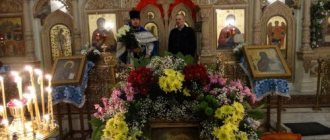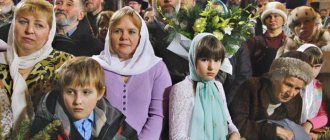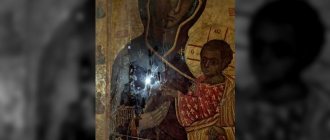From time to time the epithet “of ever-memorable” comes across. They often write this word with mistakes: sometimes unmemorable, sometimes half-memorable, or even worse. What does its strange prefix ever- mean, and what meaning does it itself carry?
Some consider this adjective to be synonymous with “immemorial,” that is, ancient, very distant in time. You can often come across the connotative expression “since ever-memorable times,” which, instead of the implied “since a long time ago,” actually means “since unforgettable times.” This is because ever-memorable originally meant “living in memory forever.” Prisno is an obsolete adverb meaning “always, forever”, from the adjective prisny - “true, eternal.” In the Russian language, as follows from Dahl’s dictionary, there were many complex words beginning with ever-: ever-blooming, ever-blessed, ever-gracious, ever-joyful. However, such words were used most often in the speech of Orthodox clergy and in our time are completely outdated.
Miraculously, the surviving word ever-memorable is now used, as a rule, instead of the word “unforgettable” to create an ironic context. In some places, memorable machines selling sparkling water have been preserved.
Jerzy Lisowski
Download this article
Each of us has probably heard such definitions in relation to the deceased as “newly departed” and “ever remembered.” What does this mean and until when should the deceased be called newly deceased?
In the Orthodox tradition, a newly deceased person is called a newly deceased person within forty days after his death.
Exodus of the soul from the body.
Why exactly forty days?
To answer this question we must turn to the Bible. Perhaps the oldest roots should be sought in the ancient Egyptian burial tradition. This is how Jacob was buried:
(Gen. 50:2,3)
And he [Jacob] was fulfilled forty days, for so many days are used for embalming, and the Egyptians mourned him for seventy days.
You can also notice that the number “forty” in general in the Bible has a certain sacred meaning:
(Num. 14:33)
Moses led the Jews through the desert for exactly forty years.
(Exodus 24:18)
For forty days he talked with God before receiving the tablets
(Mark 1:13)
Christ fasted in the desert for exactly forty days
Christ in the desert.
Kramskoy. 1872 (Acts 1:3)
After the Resurrection, Christ remained on earth for forty days, teaching the apostles
It is not surprising that over time, exactly forty days became the traditional period of commemoration, and it was this period that was approved by the apostles. A later Christian interpretation explains the forty-day period this way:
just as the Lord God resisted the devil during the forty-day fast and overcame him, so the servant of God must resist the dark forces, overcome them and find grace in Paradise.
See also the article How to read the psalter for the deceased at home for up to 40 days
What happens to the soul of the newly deceased during this time?
According to the beliefs of the Orthodox Church, the soul remains on earth for the first two days. She visits places associated with the actions of the deceased - good or bad, places filled with memories of the sorrows and joys of life. In addition, the soul will have to get used to its new position and get used to its new existence.
On the third day, the soul ascends to heaven and, accompanied by two angels, goes through ordeal - a test on the path to God. At the ordeal, the soul is consistently responsible for the sins committed throughout its life.
Ordeal.
From the third to the ninth day the soul observes the beauty and bliss of paradise.
Garden of Eden. Bruegel. 1612
From the ninth to the fortieth day, the soul observes all the horror of hell, the torment and suffering of sinners.
Hell. Hans Memling. 1485
After forty days, the soul appears before God for a private trial, where the question of its location (hell or Paradise) until the Last Judgment is finally decided.
See also the article The Mother of God Rule
How to pray for the newly deceased?
According to Orthodox belief, prayers over a period of forty days are especially important. The soul must go through ordeals and cannot pray on its own, but the prayers of loved ones make it easier to pass the tests. With fervent prayers, even the most lost souls can be saved from hell.
Immediately after the death of a person, the canon of the same-dead is read about his soul.
You can read to relatives, but it is better to call a priest.
Then, already in the church, a memorial service (prayer service for the deceased) is served for the newly deceased. It is advisable to order a memorial service in the church three times: over the body of the deceased, on the third and fortieth day.
Sometimes, instead of a memorial service, a litiya is served - a shortened version of the memorial service. If a memorial service lasts 40-50 minutes, then the lithium lasts no more than 15.
Then it will be very useful to order magpie. Sorokoust is the daily commemoration of the newly deceased during the liturgy for forty days.
At home, family and friends need to read the Psalter. Twenty chapters of kathisma are supposed to be read in forty days. In addition, at home you must read a special prayer for the newly deceased.
Prayer for the newly deceased:
“Remember, O Lord our God, in faith and hope, the life of your eternal newly departed servant (or your servant), (name), and as he is good and a lover of mankind, forgiving sins and consuming iniquities, weaken, forgive and forgive all his voluntary and involuntary sins, raising him up at Thy holy second coming into the communion of Thy eternal blessings, for the sake of which in Thee is the only faith, the true God and Lover of mankind. For Thou art the resurrection and life and rest of Thy servant, (name), Christ our God. And we send up glory to You, with Your beginningless Father and with the Most Holy Spirit, now and ever and unto ages of ages, Amen.”
Relatives should read it themselves in any free time.
If desired, you can read a special prayer for the deceased. There are separate prayers for spouses, parents, and children. In addition, there are separate prayers for the unbaptized and suicides. Although you can get by with the usual ones, you still shouldn’t neglect these prayers. You can find them in any Orthodox prayer book.
Orthodox Life
Archimandrite Dosifei (Mikhailyuk) talks simply and clearly about widespread church practice.
– Who, according to the canons, is remembered for health, and who for repose?
– According to church canons, the Orthodox Church commemorates only its members, who constitute the one Body of Christ (1 Cor. 12:12–14, 27). Of course, living Orthodox Christians baptized in the Church are remembered for their health. Orthodox Christians who died in peace with the Church and were buried according to the Orthodox rite are remembered for their repose. Naturally, the Holy Church does not commemorate people who have died without permission, since suicide is a very serious sin.
– When can notes be submitted?
- During the whole year. But it should be noted that they must be submitted in advance, that is, not during the Liturgy or before its very beginning, but earlier or, even better, in the evening at Vespers, so that the priest can calmly remember and pray for the people indicated in the note.
– What types of notes exist, besides “about health” and “about repose”?
- There are no other notes. Notes “about health” and “about repose” can be one-day or multi-day: 40 days, six months, a year, three years and more. It should also be mentioned that notes can be submitted both for the Liturgy and for private services - prayer services, which Christians order according to their needs. For example: prayer for the sick, for those traveling, thanksgiving.
– How many names can be mentioned in one note?
– There are no canonical restrictions, but usually each parish or monastery uses forms with marked lines to record names. As a rule, their number is in the range of 10-15.
– Is it important in which case names are written?
– According to established church tradition, names are written in the genitive case. This is important for the priest, because in prayer names are mentioned in the genitive case and he does not have to decline them. It should also be noted that it is very important to write names legibly and correctly.
– If you write the name of a priest or bishop, do you need to indicate the rank?
– You must write: deacon, priest or bishop.
– How to register children correctly?
– According to the established church tradition, children under 7 years of age are called babies, and from 7 to 14 – adolescents (youths).
– Is it permissible to write such words before a name as: sick, traveling, prisoner?
– It should be noted that God already knows the needs, requests and condition of each person, although the priest does not have such knowledge. Therefore, it should be indicated, since in the Church there are special petitions (for the sick, traveling, etc.) and the priest, by proclaiming them, intensifies his prayer for certain people.
– Should “student”, “grieving”, “widow”, “pregnant”, “suffering” be indicated? What should you not write in notes?
– Of course, you can, but you shouldn’t go into details. According to accepted tradition, they usually indicate: “for the sick, traveling, students, and those on the battlefield.” Pregnant women are also especially noted (they write: non-idle).
– And in funeral notes, when is it written “newly deceased” and when “of ever-memorable”?
– The deceased is commemorated as newly deceased until 40 days after death, and then commemorated as eternally remembered. The word “ever-memorable” is usually not written, because it goes without saying.
– When is magpie served?
– Sorokoust is a forty-day commemoration at the Divine Liturgy, which can be served throughout the year according to the needs of every Christian believer.
Interviewed by Natalya Goroshkova
Eve in church
Eve.
The eve (or eve, the name “funeral table” is also used) is a special table in the church where the Crucifixion is located and where candles for repose and offerings for remembrance should be placed.
What do they put on eve in church? On the eve you can put food for the remembrance of the dead. As a rule, they put in flour, bread, sugar, and less often - vegetables and fish; in the absence of fasting, it is not forbidden to put in quick food, for example, eggs or milk.
Easter is usually served with eggs and Easter cakes.
You can put oil for lamps and wax for candles. There is no strict regulation of offerings, the only strict exception is meat; it cannot be brought under any circumstances: in the Orthodox tradition, offerings can only be bloodless.
The brought products are then distributed to the clergy and temple workers, and, if possible, to the poor. Along with the food, they usually put a note with the name of the deceased who needs to be remembered for his repose. Then, during the meal, the clergy will definitely remember the deceased.
How to order a memorial service?
A worship service in which believers ask God, the Mother of God or the saints for mercy or give thanks for some event. A prayer service can be ordered at a church store and at the same time submit a note about your health. It is better, of course, to attend it yourself.
A service at which the dead are remembered. Memorial services are served at the request of believers and on established days of remembrance of the dead by the entire Church - on Radonitsa and parental Saturdays. At a memorial service, notes of repose are written.
When reading the Psalter (a book of the Old Testament, consisting of 150 psalm-songs), people are reminded of health and peace. This is the only type of commemoration that does not occur during worship and is widespread throughout the Russian Orthodox Church as an old tradition. Most often, this type of commemoration occurs in monasteries, and sometimes occurs in parishes. Information must be clarified at the temple or monastery where you want to order a commemoration.
What does “ever remembered” mean?
The word “prisny” is translated from Old Church Slavonic as “eternal.” The name itself suggests that the deceased will be remembered by his family and friends throughout their lives. The deceased is called ever-remembered on days that are memorable for him: birth, name day, death.
It should be remembered that death for an Orthodox Christian is not the end of life; the human soul is immortal. Therefore, you should not grieve greatly for the deceased, you just need to sincerely pray for him.
By leaving a comment, you accept the user agreement
What kind of notes are there for the Church about repose, what do they look like: types
Types of notes about repose Outwardly, a ready-made note about repose is almost all similar to the form that is used for requests for a person’s health.
The only difference is the black mourning edging. It is precisely by this that people who are ignorant of church rules understand which note is preferable to use. Types of funeral notes:
- A simple note. In this case, the name of the deceased will be mentioned only once at the next service.
- Sorokoust. Prayer is considered more powerful the way it is read during the liturgy. They will ask for the deceased for 40 days in a row.
- Postal note. It is served on the day of the beginning of Lent. In this case, they will ask for the deceased until Wednesday of Holy Week.
- Memorial service. It is served on the 3rd, 9th and 40th day after death, as well as on birthdays and name days. In this case, the person asking must be present during the prayer and pray from the bottom of his heart with the priest.
About health
They commemorate living baptized people.
About repose
They commemorate dead baptized people.









